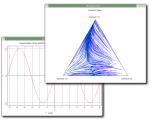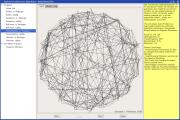

ts2python is a transpiler that converts TypeScript-interfaces to Python TypedDict-classes and provides runtime JSON-validation against those interfaces/TypedDicts.
Interoperability between different programming languages can always be challenging. TypeScript is a superset of Javascript and possibly the most popular non-Javascript Web-programming language and, thus, one of the most popular front-end-programming languages. Python on the other hand is the most popular language in scientific computing and data science. It also has a stronghold in server-programming which means it is a popular backend-programming language as well. A convenient way of exchanging data between Python and Typescript is by serializing the data in the well-known and very simple JSON-Format. However, doing so, one looses the type-information on the way. ts2python allows to carry over the type-information from TypeScript to Python as well, by producing an equivalent Python-TypedDict definitions for any TypeScript-interface you throw at it. This allows to process TypeScript-data on the Python side with the same rigorous static type checking as on the TypeScript side.
Domain specific languages (DSL) are widespread in computer sciences, but seem to be underused in the Digital Humanities. While DSLs are sometimes introduced to Digital-Humanities-projects as practical adhoc-solution, these solutions are often somewhat "quick and dirty". In other words they are more of a hack than a technology. The purpose of DHParser is to introduce DSLs as a technology to the Digital Humanities. It is based on the well known technology of EBNF-based parser generators, but employs the more modern form called "parsing expression grammar" and parser combinators as a variant of the classical recursive descent parser. Find the source in the GitLab repository.
 SchnelleSeite is a static site generator similar to
Jekyll or Hugo. In contrast to
a content management system a static site generator renders the complete
website before it is transferred to the server. The server merely needs to
deliver static pages, which makes the site faster and less vulnerable to
security risks than a dynamic site, although it is not as flexible.
SchnelleSeite is a static site generator similar to
Jekyll or Hugo. In contrast to
a content management system a static site generator renders the complete
website before it is transferred to the server. The server merely needs to
deliver static pages, which makes the site faster and less vulnerable to
security risks than a dynamic site, although it is not as flexible.
Different from most static site generators, SchnelleSeite does support multilingual sites (like this homepage) right from the start. Also it has some support for the needs of scientists, like literature databases such as bibtex. Here is the source code.
 GWTPhotoAlbum is an internet photo gallery and slide show that has been realized
with the google web toolkit. It requires only a
passive server and can also be started locally from the file system. There is
a small python script
which allows to assemble an internet photo gallery. The images are stored in
several different resolutions. GWTPhotoalbum picks the download resolution
depending on the screen size of the client device and the connection speed. A visible
caption can be added to the photos.
GWTPhotoAlbum is an internet photo gallery and slide show that has been realized
with the google web toolkit. It requires only a
passive server and can also be started locally from the file system. There is
a small python script
which allows to assemble an internet photo gallery. The images are stored in
several different resolutions. GWTPhotoalbum picks the download resolution
depending on the screen size of the client device and the connection speed. A visible
caption can be added to the photos.
As an example, see the mountain photo gallery. Further details and the programm itself can be found on the project website.
 CoopSim is a computer program
for simulating a game theoretic model of cooperative behaviour that
can be used in biology as well as social sciences. The model is the
reiterated pairwise prisoners dilemma that has been made popular
by Robert Axelrod and his book "The Evolution of Cooperation". The
reiterated pairwise prisoners dilemma can be regarded as a formal
description of some (but certainly not all!) cooperation dilemmas.
CoopSim is a computer program
for simulating a game theoretic model of cooperative behaviour that
can be used in biology as well as social sciences. The model is the
reiterated pairwise prisoners dilemma that has been made popular
by Robert Axelrod and his book "The Evolution of Cooperation". The
reiterated pairwise prisoners dilemma can be regarded as a formal
description of some (but certainly not all!) cooperation dilemmas.
CoopSim follows the description in Axelrods book. Different strategies can be put against each other in a computer tournament. The user can select the strategies, adjust game parameters and inspect the outcome of single matches, the whole tournament and the ecological development over a sequence of tournaments.
CoopSim is open-source-software under the MIT License and can be downloaded from the GitHub-repository.
 PyPlotter is a very lean
Python package for plotting graphs and
diagrams. It is compatible to Python 2 and 3 and can also be run under
jython, the java version of python.
PyPlotter is a very lean
Python package for plotting graphs and
diagrams. It is compatible to Python 2 and 3 and can also be run under
jython, the java version of python.
PyPlotter allows plotting on linear and logarithmic scales. Additionally, that it contains classes for plotting simplex diagrams, as they are used in game theory.
Through a minimal abstraction layer, PyPlotter can very easily be adjusted to different graphical toolkits. Presently, Tkinter, the Java AWT, wxWidgets, Qt 4 and 5, gtk 2 and Postscript are supported.
PyPlotter is open-source-software under the MIT License. Here, you find the PyPlotter source code and the manual.
 Evolutionary Algorithms form a special class of optimization algorithms where
one tries to imitate the mechanisms of evolution in nature: reproduction,
variation and selection, in order to solve optimization problems. In
connection with a chapter on "Neuheit in evolutionären Algorithmen"
(Novelty in evolutionary Algorithms) that I contributed to the book
"Das Neue in Ökonomie und Management" (ed. Birger Priddat and Peter Seele,
Gabler Verlag, Wiesbaden 2008) I wrote a small example program that
demonstrates how evolutionary algorithms work on the classical problem of
the "Traveling Sales Person".
Evolutionary Algorithms form a special class of optimization algorithms where
one tries to imitate the mechanisms of evolution in nature: reproduction,
variation and selection, in order to solve optimization problems. In
connection with a chapter on "Neuheit in evolutionären Algorithmen"
(Novelty in evolutionary Algorithms) that I contributed to the book
"Das Neue in Ökonomie und Management" (ed. Birger Priddat and Peter Seele,
Gabler Verlag, Wiesbaden 2008) I wrote a small example program that
demonstrates how evolutionary algorithms work on the classical problem of
the "Traveling Sales Person".
Start the demonstration program using Java Web Start. (Java Runtime Version 1.6 required!) Or download the demonstration program (for Linux und Windows, 2.7 MB incl. Java-sourcecode). Or download the source code only.
 In order to develop strategies for the
cultaptation Social Learning Strategies Tournament
I programmed a tournament engine that implements the rules of the tournament. Together with
a group of students from Bayreuth we could then develop and analyze our strategies and select the
best strategy to take part in that tournament.
In order to develop strategies for the
cultaptation Social Learning Strategies Tournament
I programmed a tournament engine that implements the rules of the tournament. Together with
a group of students from Bayreuth we could then develop and analyze our strategies and select the
best strategy to take part in that tournament.
Anyone interested in examining the cultaptation model can download the cultaptation engine. The installation is explained in the "read me"-file.